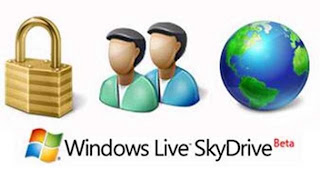If you have multiple offices, traditional network attached storage (NAS) may not cut it — you might have to take it to the cloud. You may also find it easier to use online storage so that you can access your files and data from any location and share files with others. You might also find it useful for backing up your data, which provides you with an off-site backup location in case of a disaster or theft.
Microsoft's SkyDrive is one of the more popular online storage options. It was originally called Windows Live Folders and is still a part of the Windows Live offerings. When the service started back in 2007, Microsoft only offered 5 GB of storage space, but in 2008 increased the quota to 25 GB while still keeping it totally free.
Microsoft's SkyDrive is one of the more popular online storage options. It was originally called Windows Live Folders and is still a part of the Windows Live offerings. When the service started back in 2007, Microsoft only offered 5 GB of storage space, but in 2008 increased the quota to 25 GB while still keeping it totally free.
You can upload or download files to SkyDrive via your browser or through Microsoft Office applications. You can even create and edit Word, Excel, PowerPoint, and OneNote documents in SkyDrive right from your browser using the new Microsoft Office Web Apps. Furthermore, you can access your SkyDrive folders and files right inside Windows by using free, third-party utilities.
Integrating SkyDrive into Windows
After you've signed up for your own SkyDrive account, the first thing you'll probably want to do is integrate it into Windows on your computers. This will give you quick and easy access to your online storage. You'll be able to browse your content from Windows Explorer (Computer or My Computer) and create Windows shortcuts to specific folders or files.
SDExplorer is one utility you can use. The free edition supports the basic functionality of SkyDrive, and the premium edition offers even more features, such as the ability to change the share modes. Once installed, you open Computer, double-click the SDExplorer icon, and see all your SkyDrive folders.
Another third-party utility is the Gladinet Cloud Desktop. It supports SkyDrive and many other services, such as Google Docs, FTP servers, WebDav, Box.net, and Amazon S3. It mounts a new drive letter in Windows. You open that drive and click the SkyDrive directory to access your online storage.
Sharing Your Documents
There are several features to help you share your files, favorites, and photos. You can share with specific people, all your friends, your friends and their friends, or everyone. This is specified by each folder's sharing permissions. Open a folder, click Share > Edit Permissions.
Next, you probably want to let your friends or colleagues know where they can access your documents. One way is to send them a hyperlink. You can send them a link where they must log in with a Windows Live ID, so you can restrict access to specific people, friends or friends of friends. However, you can send a link where no login is required — great when sharing with everyone.
You can either get a link to copy into an e-mail or IM message yourself, or you can send a link via email using SkyDrive. Start by opening a folder and clicking the Share menu for either a file or the folder.
Another sharing feature is the ability to embed folders on a Web page by copying and pasting some HTML code. This is great if you run your own website or blog. Open a folder and click Share > Embed on the folder menu.
If you or your friends use RSS feeds (maybe on the iGoogle homepage, Windows desktop, or mobile phone) you should check out the RSS Feed. If you're sharing a folder publically, click Share > RSS Feed on the folder menu. Then you can copy and paste the URL into a feed reader. Then you'll be able to see when changes are made to the folder. The feeds will contain preview images of the files and links to download them.
Syncing and Sharing Your Favorite Links
SkyDrive can also store links to your favorite Web pages. Just install the Windows Live Toolbar on your computers, sign in with your Windows Live ID, and your Internet Explorer favorites will be synchronized among all the computers. Plus you can view them on the SkyDrive site from any computer.
Like with documents, you can also share favorites with select people, your friends, your friends and their friends, or everyone. The sharing settings are just like with documents. You can set the permissions, get or send links, embed, or view the RSS feeds.
Sharing Your Photos
You can also use SkyDrive to store and share your photos. You can create different albums, which behave similarly to regular SkyDrive folders. Plus you can tag people in the photos and leave comments. You can download them into the Windows Live Photo Gallery or as a ZIP file, while retaining the tags. It also keeps the EXIF metadata, such as camera info and the date taken. You can also view the photos in the SkyDrive site by browsing through them or viewing as a slide-show.
Check Out Other Windows Live Services
Now you should be familiar with SkyDrive and how to use it. Next you might want to check out other services in the Windows Live brand. You can download the Windows Live Essentials, a pack of programs and utilities, and you might also want to check out the online Calendar and Contacts.

No comments:
Post a Comment